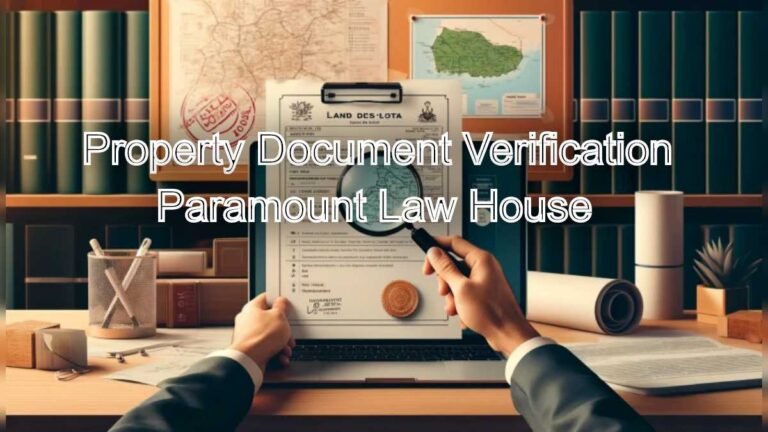Gift Deed Drafting: Expert Assistance for Property Transfer
Gift Deed Drafting: Transferring property can be a significant life event. Indeed, it often involves deep personal relationships. Many prefer to transfer…
Gift Deed Drafting: Transferring property can be a significant life event. Indeed, it often involves deep personal relationships. Many prefer to transfer property through a gift deed. This method allows for a smooth, voluntary transfer. It avoids the complexities of a will or sale. However, drafting a gift deed is not a simple task. It requires meticulous attention to detail. It also demands a thorough understanding of legal requirements. Mistakes can lead to future disputes. They can even result in the deed being invalidated. Therefore, expert assistance is not merely beneficial. It is absolutely essential. Paramount Law House: Property Lawyers 24×7 provides comprehensive legal guidance. We ensure every gift deed is legally sound. We safeguard your interests and the recipient’s future.
Gift Deed Drafting: Expert Assistance for Property Transfer: Paramount Law House
Understanding the Essence of a Gift Deed
Firstly, it is crucial to grasp what a gift deed entails. It is a legal document. It facilitates the transfer of property from one person to another.
1. Definition of a Gift
Under Section 122 of the Transfer of Property Act, 1882, a “gift” is defined. It is the transfer of certain existing movable or immovable property. This transfer happens voluntarily. It occurs without consideration. Furthermore, the transfer must be made by one person, the donor. It must be accepted by or on behalf of another, the donee. This acceptance must occur during the lifetime of both the donor and donee. Consequently, a gift is a transfer without monetary exchange.
2. Key Elements of a Valid Gift
Several elements are indispensable for a valid gift. There must be existing property. The transfer must be voluntary. It must also be without consideration. The donor must be competent to contract. The donee must accept the gift. For instance, the transfer must be effected as per the law. Consequently, missing any element can invalidate the deed.
3. Movable vs. Immovable Property
The process differs slightly for movable and immovable property. For immovable property, the gift must be effected by a registered instrument. This instrument must be signed by the donor. It must also be attested by at least two witnesses. For instance, a gift of movable property can be made by a registered instrument or by delivery. Consequently, registration is mandatory for land or buildings.
4. Irrevocability of a Gift
Once a gift deed is validly executed and registered, it is generally irrevocable. The donor cannot take back the property. For instance, exceptions are very limited. They typically involve fraud, undue influence, or mutual mistake. Consequently, a gift is a final and binding transfer.
Essential Components of a Well-Drafted Gift Deed
Secondly, a properly drafted gift deed must include specific, detailed clauses.
1. Identification of Parties
The deed must clearly identify the donor and donee. This includes their full names, addresses, and relationship. For instance, accurate identification prevents confusion. Consequently, it ensures the correct parties are legally bound.
2. Clear Description of Property
The property being gifted must be described precisely. This includes its full address, area, boundaries, and any unique identification numbers. For instance, for immovable property, the survey number, patta number, and T.S. No. are crucial. Consequently, a detailed description avoids ambiguity regarding the gifted asset.
3. Statement of Voluntary Transfer
The deed must explicitly state the transfer is made voluntarily. It must confirm it is made without coercion or undue influence. For instance, this clause affirms the donor’s free will. Consequently, it bolsters the deed’s legal validity.
4. Absence of Consideration
The deed must clearly state that the transfer is made “out of natural love and affection” or similar terms. It must confirm the absence of any monetary consideration. For instance, this distinguishes a gift from a sale. Consequently, it establishes the fundamental nature of the transaction.
5. Acceptance of Gift by Donee
The deed should include an explicit clause confirming the donee’s acceptance of the gift. This acceptance must occur during the lifetime of both parties. For instance, the donee’s signature on the deed signifies acceptance. Consequently, acceptance is a vital legal requirement for a valid gift.
6. Rights and Liabilities
The deed should specify the rights being transferred to the donee. It should also clarify any existing encumbrances on the property. For instance, if there is a mortgage, the deed should mention it. Consequently, this provides clarity on the property’s legal status.
7. Attestation by Witnesses
For immovable property, the deed must be attested by at least two witnesses. They must sign the document in the presence of the donor. For instance, the witnesses confirm the donor’s signature and voluntary act. Consequently, attestation adds legal weight and authenticity.
The Process of Executing and Registering a Gift Deed
Thirdly, proper execution and registration are paramount for a gift deed’s legal validity, especially for immovable property.
1. Stamp Duty Payment
Stamp duty is a state-specific tax. It is levied on the transfer of property. For instance, the amount of stamp duty varies by state. It also depends on the relationship between the donor and donee. Consequently, paying the correct stamp duty is a prerequisite for registration.
2. Registration with Sub-Registrar
For immovable property, a gift deed must be registered with the Sub-Registrar of Assurances. This occurs in whose jurisdiction the property is located. For instance, both the donor and donee (or their authorized representatives) must be present. They must present valid identification. Consequently, registration provides legal proof of the transfer and public notice.
3. Documentation Required
Various documents are required for registration. This includes the original gift deed. It also covers property documents (e.g., parent deed, patta). Identity proofs of parties and witnesses are also needed. For instance, tax receipts and an Encumbrance Certificate are also often required. Consequently, a comprehensive set of documents speeds up the process.
4. Biometrics and Photograph
During registration, both the donor and donee typically undergo biometric scanning. Their photographs are also taken. For instance, this process ensures the authenticity of the parties involved. Consequently, it prevents fraudulent transfers.
5. Mutation of Property Records
After successful registration, the donee should apply for mutation of property records. This updates the land records in their name. For instance, this step ensures that municipal or revenue records reflect the new ownership. Consequently, mutation is crucial for official recognition of ownership.
Legal Pitfalls and How Expert Assistance Helps
Fourthly, navigating gift deed drafting without expert legal help can lead to significant problems.
1. Improper Drafting
Ambiguous language or missing clauses can render the deed ineffective. For instance, a vague property description can lead to disputes. Consequently, expert drafting ensures clarity and legal robustness.
2. Non-Compliance with Legal Formalities
Failure to adhere to statutory requirements can invalidate the gift. This includes incorrect stamp duty, lack of proper attestation, or non-registration. For instance, a gift of immovable property without registration is void. Consequently, legal experts ensure all formalities are met.
3. Undue Influence or Coercion Claims
Disgruntled family members might challenge a gift deed. They might allege undue influence or coercion. For instance, clear documentation and witness testimony can counter such claims. Consequently, a lawyer can help establish the voluntary nature of the gift.
4. Tax Implications
While gifts to certain relatives are usually tax-exempt for the donee, there can be tax implications in other scenarios. For instance, gifts from non-relatives above a certain value are taxable. Consequences can arise for the donor if capital gains tax is triggered on certain assets. Consequently, a property lawyer can advise on potential tax liabilities.
5. Future Disputes and Litigation
Poorly drafted or improperly executed gift deeds are ripe for future family disputes. They can lead to costly and time-consuming litigation. For instance, disputes over ownership or terms can tie up property for years. Consequently, expert drafting minimizes the risk of legal challenges.
6. Dealing with Encumbrances
Property might have existing encumbrances like mortgages or charges. A gift deed must address these clearly. For instance, failing to disclose or manage encumbrances can create legal burdens for the donee. Consequently, legal experts ensure full disclosure and proper handling of such issues.
Paramount Law House: Property Lawyers 24×7 Advantage
Paramount Law House provides unparalleled legal services for gift deed drafting and property transfer. We are committed to meticulous detail and client protection.
1. Specialized Property Law Expertise
Our lawyers possess deep knowledge of the Transfer of Property Act, 1882, Registration Act, 1908, and relevant state laws. For instance, we specialize in property transactions in Chennai and Tamil Nadu. Consequently, our expertise ensures compliant and effective deeds.
2. Meticulous Drafting and Review
We draft gift deeds with precision. We ensure every clause is clear, comprehensive, and legally sound. For instance, we identify potential ambiguities. We also safeguard against future challenges. Consequently, our meticulous approach prevents errors.
3. End-to-End Assistance
We provide complete support from consultation to registration. This includes advising on stamp duty calculation. It also covers preparing all necessary documentation. For instance, we facilitate smooth interaction with the Sub-Registrar’s office. Consequently, we manage the entire process efficiently.
4. Proactive Risk Mitigation
We identify and address potential legal pitfalls early. We advise on minimizing the risk of future disputes. For instance, we ensure the voluntary nature of the gift is undeniable. Consequently, our proactive approach protects both donor and donee.
5. 24×7 Accessibility
Property matters can arise at any time. Our services are available 24×7. For instance, we offer immediate legal advice and support. Consequently, timely assistance is always at hand.
6. Client-Centric Approach
We prioritize clear communication and compassionate client service. We explain complex legal terms simply. For instance, we ensure clients understand every aspect of the transfer. Consequently, our client-focused philosophy builds trust and peace of mind.
Frequently Asked Questions
A Gift Deed is a legal document used to transfer existing movable or immovable property from one person, the donor, to another, the donee, voluntarily and without any consideration (money or value exchange). According to Section 122 of the Transfer of Property Act, 1882, the transfer must be accepted by the donee during the lifetime of both parties.
Yes, for immovable property (like land or a building), the Gift Deed must be mandatorily registered with the Sub-Registrar of Assurances. This registration process requires the donor’s signature, attestation by at least two witnesses, and payment of stamp duty. Without registration, a gift of immovable property is void.
Generally, no. Once a Gift Deed is validly executed and registered, it becomes largely irrevocable. The donor cannot take back the property. Exceptions are very limited and usually involve specific circumstances like fraud, undue influence, or mutual mistake, which must be proven in court.
Common pitfalls include improper drafting with ambiguous language, non-compliance with legal formalities (like incorrect stamp duty or lack of proper attestation), and potential claims of undue influence or coercion by other family members. Such errors can lead to the deed being invalidated or future litigation.
Paramount Law House provides expert assistance by meticulously drafting the Gift Deed to ensure clarity and legal soundness. They guide clients through stamp duty calculation, prepare all necessary documentation, and facilitate the entire registration process. Their expertise minimizes legal pitfalls and safeguards the interests of both the donor and the donee.
Conclusion
Transferring property via a gift deed is a meaningful act. It allows for a voluntary and gratuitous transfer of assets. However, it demands precise legal execution. A comprehensive understanding of the Transfer of Property Act, 1882, the mandatory components of a gift deed, and the detailed registration process is vital. Overlooking even minor legal formalities or failing to draft the deed meticulously can lead to severe legal pitfalls and future litigation. Paramount Law House: Property Lawyers 24×7 stands as your trusted legal partner. By offering specialized property law expertise, meticulous drafting, end-to-end assistance, and proactive risk mitigation, our firm ensures your gift deed is legally valid, enforceable, and secures the intended transfer seamlessly. Partnering with seasoned property lawyers is indeed the best way to safeguard your valuable assets and ensure peace of mind for all parties involved.
Read More
- Hire Purchase Agreements: Ensure Legal Compliance
- House Owner Tenant Issue Resolution: Legal Support Available
- Housing Development Law Experts: Navigate Legal Frameworks
- Illegal Possession of Immovable Property: Legal Remedies Available
- Indian Easements: Legal Guidance for Property Owners
- Department of Registration, Government of Tamil Nadu






